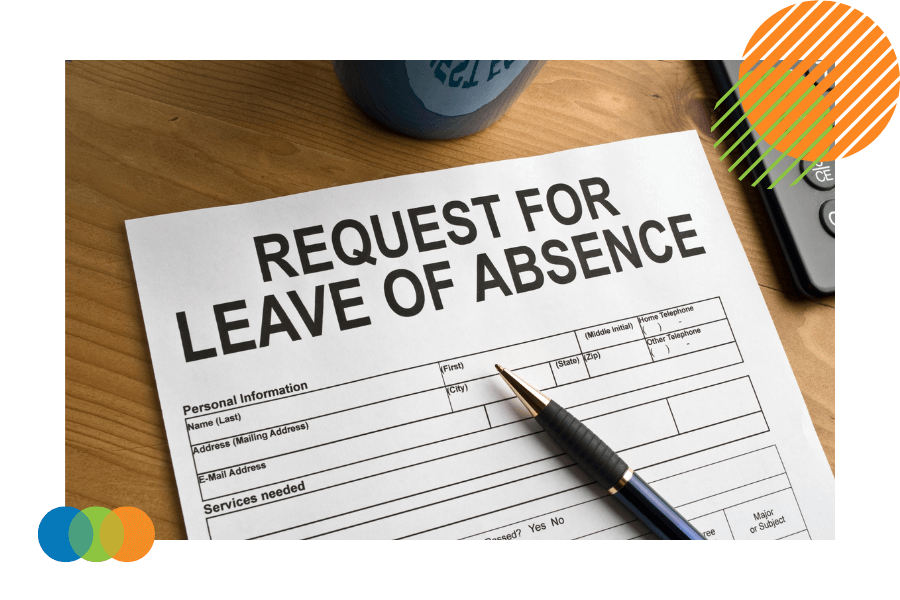 |
Written by Liz McDermott |
Navigating the complexities of leave of absence laws in California is crucial for HR professionals, as the state's regulations are among the most generous in the United States. Understanding these laws ensures legal compliance and fosters a supportive work environment. This holds particularly true when dealing with reasonable accommodation, various types of leaves of absence, and the duration of such leaves. As the landscape of employment law evolves, being well-informed on these topics can significantly mitigate liability risks and enhance employee relations.
This article aims to equip California employers with essential knowledge on managing leaves of absence, from understanding basic requirements to avoiding common mistakes and handling abuse and fraud. Employers can protect their businesses while complying with legal standards, especially pertinent in scenarios involving family leave, medical leave, pregnancy disability leave, and more.

Understanding the Basics of Leaves of Absence in California
In California, understanding the basics of leaves of absence is crucial for HR professionals, as it involves navigating a complex interplay of state and federal laws. Here are key points every HR professional should know:
Types of Leaves and Legal Requirements
California mandates several types of leaves, some required by law and others that employers can offer as optional benefits. Recognizing how these leaves interact and the legal stipulations tied to each is critical.
- Family and Medical Leave: Under the California Family Rights Act (CFRA), employees in California are entitled to take unpaid leave for serious health conditions to bond with a new child or to care for a family member with a serious health condition. This leave is similar to the rights provided under the federal Family and Medical Leave Act (FMLA) but includes additional protections under state law.
- Pregnancy Disability Leave (PDL): California law allows up to four months of leave for employees who are disabled due to pregnancy, childbirth, or related medical conditions.
- Paid Sick Leave: The Healthy Workplaces, Healthy Families Act of 2014 mandates that employers provide paid sick leave to employees who work in California for 30 or more days within a year.
- Other Types of Leave: California also requires leave for specific situations such as bereavement, jury duty, voting, and victims of domestic violence or sexual assault. Employers must understand each type of leave and the conditions under which they are applicable.
Employer Obligations and Employee Rights
Employers are required to provide eligible employees with up to 12 work weeks of CFRA leave within 12 months. This leave can be taken intermittently or in one continuous period. The employer must maintain health coverage during the leave and guarantee the same or a comparable position upon the employee's return.
Notification and Documentation
Employees are advised to notify their employers in writing as soon as they know they need a leave of absence. Depending on the circumstances, supporting documentation might be required to substantiate the leave request.
Understanding these basics helps HR professionals comply with legal standards, manage their workforce effectively, and support employees through their leave needs. This knowledge is crucial in maintaining a compliant and supportive work environment.
Key Laws Governing Leaves of Absence
Family and Medical Leave Act (FMLA)
The Family and Medical Leave Act (FMLA) mandates that private employers with 50 or more employees and all state, local, and federal government employers provide up to 12 weeks of unpaid leave annually for specific family and medical reasons. Eligible circumstances include the birth of a child, adoption, the serious health condition of the employee or a family member, or exigencies related to a family member's military deployment.
California Family Rights Act (CFRA)
Complementing the FMLA, the California Family Rights Act (CFRA) offers similar benefits but includes additional provisions tailored to the needs of Californians. CFRA applies to private employers with five or more employees and all public employers, extending the same 12-week leave entitlement for the birth of a child, adoption, or to care for a family member with a serious health condition. Notably, CFRA also covers registered domestic partners and their children, which is not included under FMLA.
Pregnancy Disability Leave (PDL)
Under California law, Pregnancy Disability Leave (PDL) allows employees disabled by pregnancy, childbirth, or related medical conditions to take up to four months of job-protected leave. This law applies to any employer with five or more employees, and the leave can be taken intermittently or all at once, depending on the medical needs. PDL is distinct from FMLA/CFRA as it specifically addresses disability due to pregnancy and does not count against the 12-week leave provided under FMLA/CFRA.
Understanding these key laws and the interplay between federal and state regulations is crucial for HR professionals to manage leave requests effectively, ensure compliance, and support employees through significant life events.
|
Vubiz offers customizable online California Leaves of Absence training. This 30-minute course meets compliance so your business can focus on growth. |
Scenarios Where Leaves of Absence Apply
Personal or Family Health Issues
California law mandates that employees can take personal leave to care for a family member with a serious health condition or recover from their medical conditions. This includes any condition that requires inpatient care or continuing treatment by a healthcare provider. The FMLA and CFRA provide up to 12 weeks of unpaid leave for these purposes, ensuring job protection during this period.
Military Service and Related Needs
Employees of the U.S. Armed Forces, including the National Guard and Reserves, are entitled to leave for service-related obligations. This includes training, deployment, or emergency duties. California employers must provide these leaves, which can vary in duration depending on the specific military requirements and the nature of the deployment.
Pregnancy and Childbirth
Pregnancy Disability Leave (PDL) allows up to four months off for employees disabled by pregnancy, childbirth, or related medical conditions. This leave is in addition to any other medical or family leave the employee may be entitled to under California law, such as CFRA or FMLA, which do not classify pregnancy as a serious health condition but allow bonding time post-birth.
Victims of Crime or Domestic Violence
Employees who are victims of crime, including domestic violence, sexual assault, or stalking, are entitled to take time off to attend court proceedings, receive medical treatment, or participate in safety planning. California law protects these employees from retaliation and ensures job protection during such leaves. Employers with 25 or more employees must accommodate these needs and cannot discriminate against employees taking such leaves.
Avoiding Common Mistakes with Leaves of Absence
Understanding Rights and Responsibilities
The Family and Medical Leave Act (FMLA) and the California Family Rights Act (CFRA) set clear guidelines to prevent employers from interfering with employees' rights to take leave. Employers mustn't require FMLA or CFRA leave employees to engage in work-related activities such as answering emails or attending meetings. This ensures compliance and respects employees' right to uninterrupted leave.
Misclassifying Leave Types
Misclassification of leave can lead to significant legal repercussions. Employers must understand the specific conditions and rights under each leave type, such as FMLA/CFRA leave, which may be taken intermittently or on a reduced schedule based on medical needs. Employers must carefully manage such arrangements to avoid the leave becoming an unintended permanent accommodation.
Failing to Communicate Properly with Employees
Proper communication with employees on leave is essential to maintaining compliance and good relations. Employers should ensure that communication with an employee on leave is nonintrusive and strictly non-work-related. Regular, minimal contact may be maintained to inform employees of significant workplace changes or requirements, like benefits enrollment, without making them feel alienated or pressured to work.
Employers must also respect employees' requests for no contact during their leave, except for critical updates or legally required information. This approach helps avoid perceiving interference with the employee's right to take leave.
Managing Abuse and Fraud in Protected Leaves
Identifying Red Flags
Employers must remain vigilant to detect potential abuse of protected leaves. Common red flags include employees using FMLA leave for non-FMLA purposes or altering medical documentation to misrepresent their condition. Patterns such as requesting leave adjacent to weekends or holidays, frequent short-term absences, or unexplained inconsistencies in leave requests can signal misuse. Additionally, if an employee can perform similar tasks at another job while on leave, this may indicate abuse. Monitoring these signs is crucial for maintaining the integrity of leave policies.
Legal Ways to Handle Suspected Abuse
When abuse is suspected, employers should adopt a structured approach to address the issue while ensuring compliance with FMLA/CFRA regulations. First, require written leave request forms and medical certifications within 15 days and ask for re-certification every 30 days or more frequently under certain conditions. Establish and enforce clear call-in procedures. If the rules are not followed, the leave request may be denied.
Employers can also request that employees schedule medical treatments around business hours to minimize disruption. If there are doubts about the authenticity of the medical condition, employers have the right to request a review of the medical certification by a designated healthcare professional. Maintaining open lines of communication with the employee can help clarify the legitimacy of the leave request and address any underlying issues respectfully.
In cases where abuse is confirmed, progressive discipline measures should be applied consistently, ranging from verbal warnings to suspension, depending on the severity of the abuse. For severe cases, seeking external legal counsel to navigate the implications and ensure proper procedural compliance is advisable.
Protecting Your Business While Complying with Laws
Balancing Business Needs with Employee Rights
Employers in California face the challenge of complying with leave laws while fostering a supportive workplace. Transparent communication and flexible work arrangements can help maintain harmony and trust while accommodating employee needs and increasing retention and satisfaction.
Developing Comprehensive Leave Policies
Employers should develop clear and comprehensive leave policies that are well-documented and easily accessible. Efficient administrative processes should be implemented to reduce the administrative burden and enhance compliance with FMLA regulations. A specific point of contact should be designated within the organization to handle FMLA-related inquiries.
Conclusion
It is important to understand the nuances and more generous provisions of the California Family Rights Act (CFRA), Pregnancy Disability Leave (PDL), and the Family and Medical Leave Act (FMLA) to avoid costly liabilities associated with non-compliance. Investing in education and training programs can ensure that the workforce knows the specifics of various leave laws, reduces misunderstandings and conflicts, and fosters a respectful and compliant organizational culture.
Throughout this article, we explored the critical components of leave laws and their implications for employers and employees. Further education can be invaluable for HR professionals looking to deepen their understanding and ensure their practices align with current regulations.
Consider Vubiz's online California Leaves of Absence training course for HR professionals looking to learn more about this regulatory requirement. This course serves as a resource for those aiming to enhance their expertise. Being well-versed in the details of California's leave of absence laws not only shields the business from legal repercussions but also contributes to a supportive organizational culture where employees feel valued and understood.
